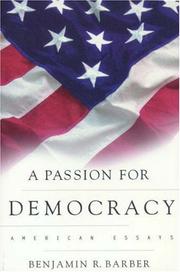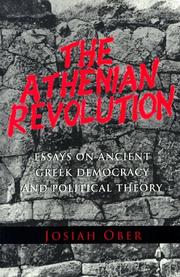| Listing 1 - 4 of 4 |
Sort by
|

ISBN: 0691057664 069122790X Year: 2000 Publisher: Princeton, N.J. : Princeton University Press,
Abstract | Keywords | Export | Availability | Bookmark
 Loading...
Loading...Choose an application
- Reference Manager
- EndNote
- RefWorks (Direct export to RefWorks)
"Benjamin Barber is one of America's preeminent political theorists. He has been a significant voice in the continuing debate about the nature and role of democracy in the contemporary world. A Passion for Democracy collects twenty of his most important writings on American democracy. In these pieces, Barber argues for participatory democracy without dependence on abstract metaphysical foundations, and he stresses the relationship between democracy and civil society, civic education, and culture."--Jacket.
Democracy --- Democracy. --- USA. --- United States. --- Academy for the Third Millennium. --- Alien and Sedition Laws. --- American Revolution. --- American republic. --- Benito Cereno (Melville). --- British Telephone. --- Calvinism. --- Clinton Administration. --- Continental Congress. --- Democratic party. --- Electronic Frontier Foundation. --- Fairness Doctrine. --- French Revolution. --- House of Representatives. --- Johns Hopkins University. --- Kennedy, Justice Anthony. --- Law of Incomplete Realization. --- Lyceum. --- Murdoch, Rupert. --- New York University. --- Pendleton, Edmund. --- Pericles. --- altruism. --- automobiles. --- bill of rights, electronic. --- books. --- capitalism. --- censorship. --- civic literacy. --- civic responsibility. --- communitarianism. --- deliberation. --- ecological interdependence. --- entertainment industry. --- factionalism. --- harmony. --- intellectual property. --- interests. --- iron law of oligarchy. --- libertarianism. --- market: advertising. --- military service. --- nationalism. --- paideia. --- proceduralism. --- race relations. --- redistricting. --- reflexivity. --- revolutionary spirit. --- secession. --- shopping malls. --- social contract tradition.
Book
ISBN: 1400828406 Year: 1990 Publisher: Princeton, NJ : Princeton Univ. Press,
Abstract | Keywords | Export | Availability | Bookmark
 Loading...
Loading...Choose an application
- Reference Manager
- EndNote
- RefWorks (Direct export to RefWorks)
Scholars in the "Critical Legal Studies" movement have challenged some of the most cherished ideals of modern Western legal and political thought. CLS thinkers claim that the rule of law is a myth and that its defense by liberal thinkers is riddled with inconsistencies. This first book-length liberal reply to CLS systematically examines the philosophical underpinnings of the CLS movement and exposes the deficiencies in the major lines of CLS argument against liberalism.
Aristotle, on rule of law. --- Bingham, Joseph. --- Blackmun, Harry. --- Brest, Paul. --- Brosnan, Donald. --- Cardozo, Benjamin. --- Constant, Benjamin. --- Edgerton, Robert. --- Ewald, William. --- Foucault, Michel. --- Frank, Jerome. --- Freeman, Alan. --- Greenawalt, Kent. --- Harries, Karsten. --- Herzog, Don. --- Humboldt, Wilhelm von. --- Hunt, Alan. --- Kierkegaard, Soren. --- Kirchheimer, Otto. --- Marxism. --- Nietzsche, Friedrich. --- abortion. --- altruism. --- anti-Semitism. --- antinomianism. --- community. --- deconstructionism. --- due process. --- duty to aid a stranger. --- epistemological neutrality. --- equal protection doctrine. --- equality under law. --- fair notice. --- fetishism. --- functionalism. --- individualism. --- informalism. --- iron law of oligarchy. --- law-and-society movement. --- legal accountability. --- legal formalism. --- legal realism. --- moral truth. --- nation-state. --- order, problem of. --- plain meaning, theory of. --- political neutrality. --- radical indeterminacy. --- reflective equilibrium. --- rule conception of society. --- rule of recognition.

ISBN: 9780691010953 0691001901 0691010951 9780691001906 Year: 1999 Publisher: Princeton (N.J.) : Princeton university press,
Abstract | Keywords | Export | Availability | Bookmark
 Loading...
Loading...Choose an application
- Reference Manager
- EndNote
- RefWorks (Direct export to RefWorks)
Where did "democracy" come from, and what was its original form and meaning? Here Josiah Ober shows that this "power of the people" crystallized in a revolutionary uprising by the ordinary citizens of Athens in 508-507 B.C. He then examines the consequences of the development of direct democracy for upper-and lower-class citizens, for dissident Athenian intellectuals, and for those who were denied citizenship under the new regime (women, slaves, resident foreigners), as well as for the general development of Greek history.When the citizens suddenly took power into their own hands, they changed the cultural and social landscape of Greece, thereby helping to inaugurate the Classical Era. Democracy led to fundamental adjustments in the basic structures of Athenian society, altered the forms and direction of political thinking, and sparked a series of dramatic reorientations in international relations. It quickly made Athens into the most powerful Greek city-state, but it also fatally undermined the traditional Greek rules of warfare. It stimulated the development of the Western tradition of political theorizing and encouraged a new conception of justice that has striking parallels to contemporary theories of rights. But Athenians never embraced the notions of inherency and inalienability that have placed the concept of rights at the center of modern political thought. Thus the play of power that constituted life in democratic Athens is revealed as at once strangely familiar and desperately foreign, and the values sustaining the Athenian political community as simultaneously admirable and terrifying.
Idées politiques --- Démocratie --- Athènes (Grèce) --- Grèce --- Politique et gouvernement --- Democracy --- History. --- Grèce ancienne --- Politique --- Democracy - Greece - Athens - History --- Self-government --- Political science --- Equality --- Representative government and representation --- Republics --- History --- Democracy. --- Greece --- al-Yūnān --- Ancient Greece --- Ellada --- Ellas --- Ellēnikē Dēmokratia --- Elliniki Dimokratia --- Grčija --- Grèce --- Grecia --- Gret︠s︡ii︠a︡ --- Griechenland --- Hellada --- Hellas --- Hellenic Republic --- Hellēnikē Dēmokratia --- Kingdom of Greece --- République hellénique --- Royaume de Grèce --- Vasileion tēs Hellados --- Xila --- Yaṿan --- Yūnān --- Ελληνική Δημοκρατία --- Ελλάς --- Ελλάδα --- Греция --- اليونان --- يونان --- 希腊 --- Aeschines. --- Bowles, S. --- Bugh, G. --- Cohen, D. --- Connor, W. R. --- Council, role of. --- Dover, K. J. --- Finley, M. I. --- Golden Age myths. --- Gomme, A. W. --- Hansen, M. H. --- Hanson, V. D. --- Iron Law of Oligarchy. --- Isagoras. --- Jones, A.H.M. --- Kagan, D. --- Knight, D. W. --- Loraux, N. --- MacDowell, D. M. --- Meier, C. --- Ostwald, M. --- Petrey, S. --- Rawls, J. --- Sinclair, R. K. --- atimia. --- decision-making. --- democratic ideology. --- evidence, problems of. --- exclusion, and citizenship. --- foundationalism. --- justice. --- koinōnia. --- liberalism. --- noncitizens: and the polis. --- objectivity. --- politeia. --- positivism. --- pragmatism. --- regime of truth, democratic. --- social contract theory.
Book
ISBN: 0691198446 Year: 2019 Publisher: Princeton, NJ : Princeton University Press,
Abstract | Keywords | Export | Availability | Bookmark
 Loading...
Loading...Choose an application
- Reference Manager
- EndNote
- RefWorks (Direct export to RefWorks)
Late nineteenth-century England witnessed the emergence of a vociferous and well-organzied movement against the use of living animals in scientific research, a protest that threatened the existence of experimental medicine. Richard D. French views the Victorian antivivisection movement as a revealing case study in the attitude of modern society toward science.The author draws on popular pamphlets and newspaper accounts to recreate the structure, tactics, ideology, and personalities of the early antivivisection movement. He argues that at the heart of the antivivisection movement was public concern over the emergence of science and medicine as leading institutions of Victorian society--a concern, he suggests, that has its own contemporary counterparts.In addition to providing a social and cultural history of the Victorian antivivisection movement, the book sheds light on many related areas, including Victorian political and administrative history, the political sociology of scientific communities, social reform and voluntary associations, the psychoanalysis of human attitudes toward animals, and Victorian feminism.Richard D. French is a Science Advisor with the Science Council of Canada.Originally published in 1975.The Princeton Legacy Library uses the latest print-on-demand technology to again make available previously out-of-print books from the distinguished backlist of Princeton University Press. These editions preserve the original texts of these important books while presenting them in durable paperback and hardcover editions. The goal of the Princeton Legacy Library is to vastly increase access to the rich scholarly heritage found in the thousands of books published by Princeton University Press since its founding in 1905.
Vivisection. --- Medicine --- History. --- Abdominal surgery. --- Abolitionism. --- Anesthesia. --- Anesthetic. --- Animal rights. --- Anna Kingsford. --- Anthrax. --- Anthropomorphism. --- Anti-Corn Law League. --- Anti-intellectualism. --- Antiscience. --- Antiseptic. --- Antitoxin. --- Apothecary. --- Assistant medical officer. --- British Institution. --- British Medical Association. --- Charles Darwin. --- Charles Dickens. --- Chartism. --- Chemotherapy. --- Clinical research. --- Clinical trial. --- Complication (medicine). --- Contagious Diseases Acts. --- Cruelty to animals. --- DEPT (medicine). --- Death. --- Diphtheria. --- Disenchantment. --- Disinfectant. --- Dissection. --- Doctor–patient relationship. --- Epilepsy. --- Frances Power Cobbe. --- General Medical Council. --- Germ theory of disease. --- Homeopathy. --- Hospital Authority. --- Hospital. --- Immunization. --- Immunology. --- Inoculation. --- Iron law of oligarchy. --- James Blundell (physician). --- Joseph Lister. --- Medical education. --- Medical ethics. --- Medical history. --- Medical jurisprudence. --- Medical literature. --- Medical research. --- Medical school. --- Monomania. --- National Anti-Vivisection Society. --- Natural theology. --- New York Academy of Medicine. --- Obstetrics. --- Ophthalmology. --- Pasteur Institute. --- Pathology. --- Pharmaceutical drug. --- Pharmacology. --- Physician. --- Physiology. --- Processing (Chinese materia medica). --- Psychoanalysis. --- Psychohistory (fictional). --- Public health. --- Public morality. --- Relationship between religion and science. --- Royal College of Physicians. --- Royal College of Surgeons. --- Royal Commission. --- Royal Humane Society. --- Royal Society for the Prevention of Cruelty to Animals. --- Scientism. --- Smallpox. --- Stephen Paget. --- Surgery. --- Tetanus. --- The Illustrated London News. --- The Island of Doctor Moreau. --- The Physician. --- The Physiological Society. --- The Politician (book). --- Therapeutic nihilism. --- Thomas Henry Huxley. --- Torture chamber. --- Toxicology. --- Tuberculosis. --- Utilitarianism. --- Vaccination. --- Vaccine. --- Victorian era. --- War. --- Water fluoridation controversy. --- William Edward Forster. --- William Paley.
| Listing 1 - 4 of 4 |
Sort by
|

 Search
Search Feedback
Feedback About
About Help
Help News
News